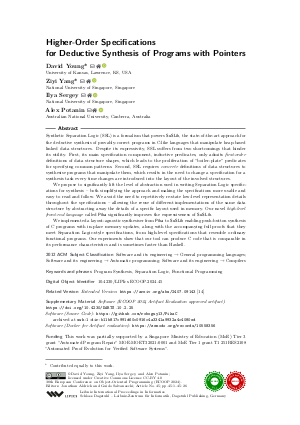@InProceedings{young_et_al:LIPIcs.ECOOP.2024.45,
author = {Young, David and Yang, Ziyi and Sergey, Ilya and Potanin, Alex},
title = {{Higher-Order Specifications for Deductive Synthesis of Programs with Pointers}},
booktitle = {38th European Conference on Object-Oriented Programming (ECOOP 2024)},
pages = {45:1--45:26},
series = {Leibniz International Proceedings in Informatics (LIPIcs)},
ISBN = {978-3-95977-341-6},
ISSN = {1868-8969},
year = {2024},
volume = {313},
editor = {Aldrich, Jonathan and Salvaneschi, Guido},
publisher = {Schloss Dagstuhl -- Leibniz-Zentrum f{\"u}r Informatik},
address = {Dagstuhl, Germany},
URL = {https://drops.dagstuhl.de/entities/document/10.4230/LIPIcs.ECOOP.2024.45},
URN = {urn:nbn:de:0030-drops-208946},
doi = {10.4230/LIPIcs.ECOOP.2024.45},
annote = {Keywords: Program Synthesis, Separation Logic, Functional Programming}
}

 Creative Commons Attribution 4.0 International license
Creative Commons Attribution 4.0 International license
